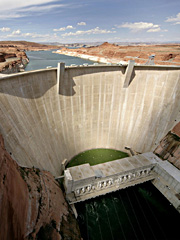May 27, 2011
Q&A with Michael Hanemann

Dr. Michael Hanemann

Climate change is expected to affect the San Francisco Bay Area's communities, agriculture, and water supplies.

Adaptive management may mitigate some of Glen Canyon Dam's profound impacts on the Colorado River ecosystem.
Michael Hanemann is a Distinguished Sustainability Scientist in the Global Institute of Sustainability and Julie A. Wrigley Sustainability Chair in the School of Sustainability and the Department of Economics, W. P. Carey School of Business. His research focuses on environmental economics and policy, water pricing and management, and the economics of adaptive management. In May 2011, he was elected to the National Academy of Sciences.
At what point did "sustainability" become part of your research vocabulary?
As an environmental economist, sustainability has always been part of my research. This goes back to my second year in graduate school, when I had a summer job writing a report for a federal agency on the effects of rapid urbanization on public water supply systems in Phoenix, Tucson, Miami, Seattle, and the outer Boston suburbs.
What are your most important sustainability-related research projects?
I am working with the California Energy Commission and local governments in the San Francisco Bay Area on two issues: to assess the vulnerability of Bay Area communities to climate change, and to develop appropriate adaptation strategies that focus on water, transportation, coastal impacts, agriculture, and health. While climate change may not be the biggest stressor right now compared to population growth and urban land use conversion, it might create a tipping point because of the increased variability and uncertainty that climate change introduces. In a similar vein, I am also working with Spanish colleagues on issues of adaptation to climate change in Spain.
Among my other projects, I am assessing the future water needs of the Hopi Tribe of northern Arizona under a new state standard that calls for an adequate supply of water to make the reservation a "comfortable homeland" and to permit sustained economic growth. I also have a continuing interest in the operation of Glen Canyon Dam and its impacts on the Colorado River ecosystem in Grand Canyon. I served on the original National Research Council committee investigating those impacts in the 1980s and I am now assisting the U.S. Geological Survey as it moves to implement an adaptive management strategy for the dam.
How will your sustainability-related research affect policy or other important decisions?
Over the course of my career, I have worked with policymakers at the state and national level to shape environmental and water policy in a manner that fairly balances the needs of current users with the interests of long-run environmental preservation and sustainability. With respect to the global issue of climate change, I am serving on Working Group III of the Intergovernmental Panel on Climate Change's (IPCC) Fifth Assessment Report, which we hope will have a significant international influence when it emerges in 2014.
What is the world sustainability challenge that concerns you most?
Water supply and climate change are the two challenges that concern me most, both individually and jointly. While aquatic ecosystems are currently strained by population growth, economic development, and land use changes, the effects of climate keep building up - perhaps more quickly than many suppose.
May 27, 2011

